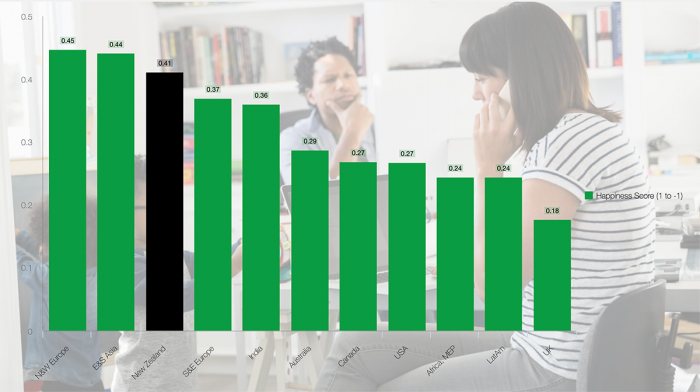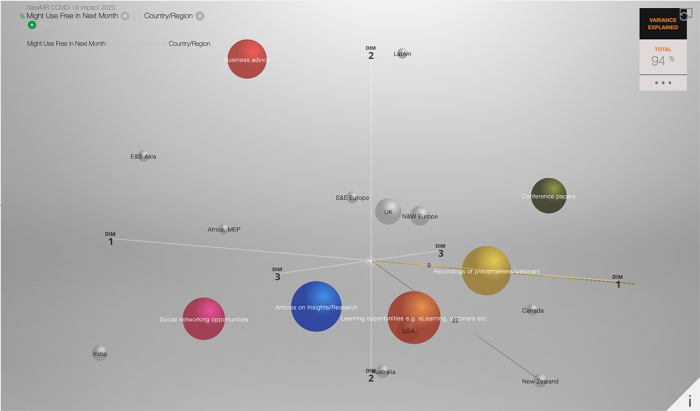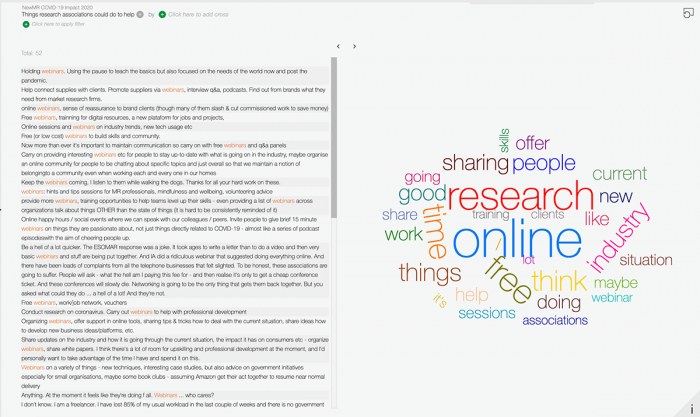Share this
Happy or sad? Visualizing data on market research sentiment during the global crisis
by Infotools on 30 Apr 2020
In a recent presentation for the Research Association New Zealand, we showed how the Harmoni platform can help researchers understand and visualize data using results from a recent survey by #NewMR
How are market researchers feeling? In a recent presentation for the Research Association New Zealand, we showed how the Harmoni platform can help researchers understand and visualize data using results from a recent survey by #NewMR. The premise of the survey was to help the #NewMR organization understand how the market research community was feeling and what researchers need most during the crisis. They tapped into market research professionals from 70 countries to gauge need and sentiment.
For our webinar presentation, Infotools Director Geoff Lowe imported the data from the survey outreach into Harmoni via SPSS file. Harmoni supports a wide range of data sources, including IBM SPSS®, SQL, Microsoft Excel, CSV, tab-delimited files, Dimensions, and more. The platform is also integrated with popular market research platforms, such as Voxco, FocusVision Decipher, and Qualtrics.
For this project, Geoff took webinar attendees through a discussion of the NewMR survey’s first wave results, showing how the insights community in different regions are reacting to the global situation. First, he took a simple question: are we happy or sad? A simple table showed several countries and their overall sentiment. At the time the survey was conducted, in late March, New Zealand was one of the happiest, while those in the United Kingdom were saddest.

Why? First, he examined the relationship between where people were currently working and how their attitudes about their work situation were tracking. Not surprisingly, those who were not working at all during the pandemic were the saddest. There were some subtleties among those who were most happy. Those who were still working in their offices seemed to be the happiest, while those working from home – who normally do so – were significantly happier. If you are used to working from home, then this new reality is not such a bad situation. Filtering by country showed that there were correlations in the WFH data and levels of happiness overall.
Another variable affecting attitudes was how long people expected the crisis to last. When using Harmoni to track this data, a clear pattern emerged. There was a strong inverse relationship between the number of months people believed the disruption would last and the current level of happiness. No big surprises here: the sooner you think it will end, the happier you are. By simply dragging and dropping different data points into Harmoni, Geoff was able to quickly show the patterns and relationships among the data.
Another key goal of the NewMR research was to find out what market researchers needed most from associations and industry support organizations. The question was “What would you use most if it was available for free?” We looked at this data with a “space graph” or correspondence map.

Many people are looking for presentations, webinars and learning opportunities during these times. The space graph showed us a particularly strong relationship between New Zealand and these opportunities – many Kiwis would take advantage of free presentations and webinars. When we look at the data as a word cloud, we can easily click on the word “webinars” and get a list of specific open-end comments by people on this topic to dive in.

The NewMR survey data helps give a picture of how the market research community as a whole is holding up during the COVID-19 pandemic. Harmoni allows us to quickly toggle among data points to graphically visualize important points of differentiation and understand the story the data is telling us.
We look forward to the next wave of the NewMR study, which is in field now. You can take the survey here: https://www.questionpro.com/a/TakeSurvey?tt=W49OMOVep2c%3D It closes on 08 May.
Share this
- March 2025 (6)
- February 2025 (3)
- January 2025 (4)
- December 2024 (5)
- November 2024 (6)
- October 2024 (4)
- September 2024 (4)
- August 2024 (6)
- July 2024 (7)
- June 2024 (4)
- May 2024 (7)
- April 2024 (6)
- March 2024 (3)
- February 2024 (8)
- January 2024 (3)
- December 2023 (6)
- November 2023 (5)
- October 2023 (3)
- September 2023 (8)
- August 2023 (4)
- July 2023 (6)
- June 2023 (6)
- May 2023 (3)
- April 2023 (6)
- March 2023 (6)
- February 2023 (4)
- January 2023 (2)
- December 2022 (2)
- November 2022 (8)
- October 2022 (6)
- September 2022 (6)
- August 2022 (7)
- July 2022 (5)
- June 2022 (6)
- May 2022 (5)
- April 2022 (4)
- March 2022 (8)
- February 2022 (7)
- January 2022 (1)
- December 2021 (2)
- November 2021 (2)
- July 2021 (4)
- June 2021 (2)
- May 2021 (4)
- April 2021 (2)
- March 2021 (5)
- February 2021 (3)
- January 2021 (3)
- December 2020 (1)
- November 2020 (5)
- October 2020 (2)
- September 2020 (5)
- August 2020 (4)
- July 2020 (4)
- June 2020 (1)
- May 2020 (3)
- April 2020 (6)
- March 2020 (3)
- February 2020 (4)
- January 2020 (2)
- December 2019 (4)
- November 2019 (4)
- October 2019 (3)
- September 2019 (2)
- August 2019 (4)
- July 2019 (5)
- June 2019 (2)
- May 2019 (4)
- April 2019 (4)
- March 2019 (2)
- February 2019 (4)
- January 2019 (3)
- December 2018 (5)
- November 2018 (2)
- October 2018 (1)
- September 2018 (3)
- August 2018 (5)
- June 2018 (4)
- May 2018 (4)
- April 2018 (3)
- December 2017 (1)
- November 2017 (2)
- October 2017 (1)
- September 2017 (3)
- August 2017 (2)
- June 2017 (2)
- February 2017 (2)
- January 2017 (2)
- December 2016 (2)
- September 2016 (1)

No Comments Yet
Let us know what you think